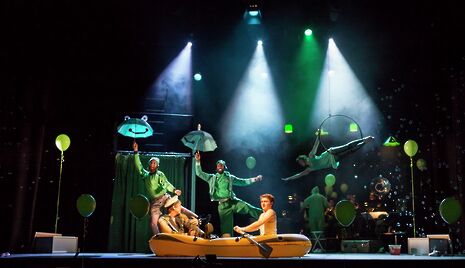Theatre: The Greek Play
Charlotte Abell is disappointed by Prometheus, but an ingenious interpretation of The Frogs finishes the evening on a high

The Greek Play was a tribute to the skill with which the Greek language can be handled by a modern company. The seamless transition of both audience and cast from the tragedy Prometheus to the comedy of The Frogs was remarkable; an odyssey from what initially seemed like another highbrow production of classical theatre to an original, and quite frankly genius leap into the modern day.
The discordant first chord of Prometheus kicked things off to a shaky start as it drowned out the opening speeches. The mise-en-scene, a simple scaffold structure which at first captured the essence of isolation, quickly posed practical problems for the audience. The subtitle screens located at either side of the stage, Prometheus (Henry Jenkinson) at the top of a ladder and the chorus on the stage floor became disassociated as they could only be appreciated in isolation. Although at times the audience struggled to follow, the cast must be commended for their reproduction of Aeschylus’ original Greek, which was often beautifully executed. However, the passion so important in tragedy was absent. Unlike an emotionally charged opera that conveys feeling through music, the singing in this performance lacked the clarity to move. The focus of this play was far too much on the words, something that the audience could only truly appreciate through the scrolling orange letters on the subtitle screen.
As a stand-alone play Prometheus would not have worked, but the juxtaposition with just about everything that followed really did permit an appreciation of Greek theatre. Although perhaps not quite the intended transition of emotionally charged drama to effortless humour, the intellectual first half meant the audience welcomed the ‘laugh a minute’ slapstick comedy in the second. Explosive laughter erupted as it quickly became apparent that the translation of The Frogs was at best ‘loose’, packed with modern quips from “unexpected item in the bagging area” to Dionysus’ (Charlie Merriman) threat to “chunder everywhere”.
The visible orchestra, props and colourful costumes were this time an aesthetic delight, able to be enjoyed because they were unified by the presence of a centre stage subtitle screen. The true charm lay in the small modern details: Hercules’ KFC bucket, the kazoos in the funeral procession and the cockney and navy boy characters ancient Greek style were particular favourites. As the audience left humming the song of the frogs, the rupture of applause as the final curtain fell was well deserved.
 Comment / Anti-trans societies won’t make women safer14 November 2025
Comment / Anti-trans societies won’t make women safer14 November 2025 News / Controversial women’s society receives over £13,000 in donations14 November 2025
News / Controversial women’s society receives over £13,000 in donations14 November 2025 News / John’s rakes in £110k in movie moolah14 November 2025
News / John’s rakes in £110k in movie moolah14 November 2025 Fashion / You smell really boring 13 November 2025
Fashion / You smell really boring 13 November 2025 Music / Three underated evensongs you need to visit14 November 2025
Music / Three underated evensongs you need to visit14 November 2025









